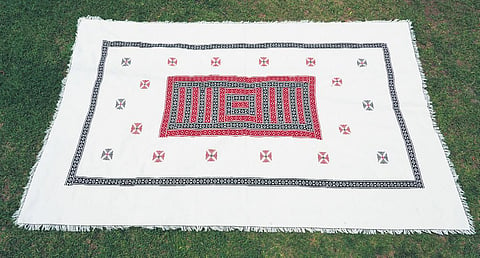

Twice a month, 90-year-old Pongari Pattima from the Toda tribal community a pastoral tribe of the Nilgiri Hills in Tamil Nadu—visits Ooty to sell traditional embroidery products. She uses the money she makes—around Rs 4,000 on each visit—to purchase raw materials for her upcoming orders. Pattima is just one of the 200 women above age 60 who collaborate with Shalom Ooty, a self-help group (SHG) founded by 59-year-old Sheela Powel in 2005. “I am happy that I am not dependent on my grandchildren for money,” says the nonagenarian.
Born and raised in Ooty, Powel was introduced to Toda art during her school years. After getting married in 1984, with two daughters to care for and a growing need for additional income, she began crafting small items like cushion covers, bags and tablecloths using handloom, which she sold in local markets. “Eventually, a few more women from nearby villages expressed interest in joining me,” she says.
In 2005, some women from the Toda tribe approached her, seeking assistance in selling the embroidered shawls they had crafted. “Their primary challenge was the inability to communicate with buyers effectively,” she recounts. In order to help them, Powel set up Shalom Ooty the same year. She manages the orders for the artisans and provides them with the necessary raw materials.
Toda embroidery, also known as ‘pukhoor’ locally, is an intricate needlework, which entails the use of red and black acrylic wool on white or off-white cotton fabric. Both sides of the cloth are usable. The motifs are drawn from mythology and nature. “The artisans are particular about their designs; they do not like repeating styles, ensuring no two pieces ever mirror the other,” says the entrepreneur, who acknowledges that sustaining this art form is challenging, as the younger generation from the community prefers pursuing employment avenues in urban areas. “There are hardly 1,300 people left in the community now, of which 700 are women. Only about 200-300 artisans remain,” she says.
These women craft a diverse range of products, including shawls, key chains, mufflers, purses and more, with prices ranging from Rs 100 to Rs 25,000. Apart from the two shops in Ooty, their products are available in cities such as Bengaluru, Mumbai, Hyderabad and Chennai through tribal fairs, as well as in Tribes India showrooms, Kamala stores (owned by the Craft Council of India), and Last Forest enterprise stores in Kotagiri and Coonoor. Additionally, their products can also be purchased through their website. So, when will you be adding one to your collection?